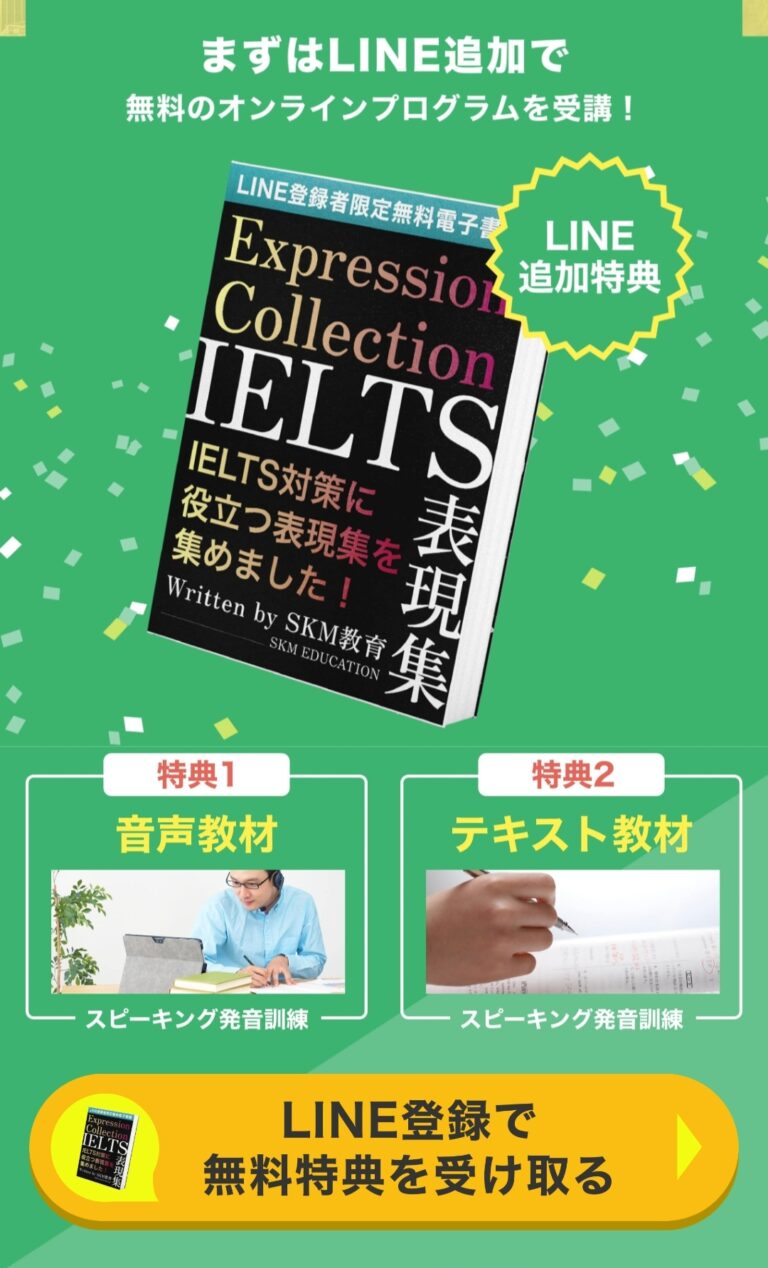こんにちは。SKです
IELTSとイギリス留学に特化した本ブログですが、本日の記事は
「IELTSライティングでスコアが上がりやすくなる。書いてはいけない動詞と正しい動詞一覧」
についてです
日本人受験者に多い話なのですが、Look forやGo throughなどの旬動詞(Phrasal Verb)をエッセイのライティングで使う方が多いです。
Phrasal Verbは我々は大学受験時にたくさん覚えましたよね。
その名残もあって、英作文でついつい書いてしまいますよね。
しかし、このPhrasal Verbはどちらかと言いますと口語表現なのです
ですので、もしあなたが今
・IELTSのライティングのスコアが上がらず困っている
・エッセイが苦手
・語彙力を伸ばしたいけどどの語彙を覚えていいか分からない
とお悩みであれば、今日の記事はとても有益な内容です
Phrasal Verbのエッセイに適したフォーマルな動詞一覧を1つの記事でまとめました。
これさえ覚えれば、エッセイで語彙のスコアがあがり、あなたのライティングスコアも段階もあがります!
最短で6.5を取って夢の留学生活を叶えてくださいね!
なぜ旬動詞がエッセイライティングに相応しくないのか?

①口語表現だから

句動詞はネイティブは日常会話で非常にナチュラルに使割れています
ネイティブの英語を理解してしっかり英会話ができるようになりたいという時には使えますが、フォーマルなスタイルが求められるライティングでは使わない方がベターです。
「旬動詞がよく使われる場面」
・カジュアルな日常会話
・ストーリー調の小説(会話文がそのまま使われることもあるのため)
・気心しれた仲のメール
たとえば、日本語でのフォーマルなシーンで当てはめた場合、こんな内容の文章を見たらあなたはどう思いますか>
”昨日、弊社の社員が御社に報告を遅れてしまったこと深くお詫び申しあげます。原因は、弊社の社員がサボっていたためにこの様な事態が発生してしまいました”
サボっては日本語では日常会話で使われる表現ですよね。フォーマルな文書の場で、”サボる”という言葉だけ使ったらおかしいですよね
英語の文面でPhrasal verbを使うと、ネイティブにとってはこれくらい違和感があるのです。
②色々な意味を持っていて伝わりにくいから

phrasal verbは様々な意味を含んだ動詞です。
「例」
(1) 〈考え・議論などを〉提示する; 述べる.
| set out one’s ideas 自分の考えを提示する |
(2) 〈…を〉飾る, 陳列する, (テーブル・いすなどを〉並べる.
| set out chairs in the meeting room 会議室に椅子を並べる. |
We set out on the journey to Brazil. 我々はブラジルの旅に出発した |
エッセイは、フォーマルかつ書き手のアイディアや主張を明確にわかりやすく述べる場所であるので
旬動詞を使うとそれが難しくなります
こういった理由で、旬動詞はエッセイライティングに相応しくないと見られています
IELTSライティングでスコアアップにつながる旬動詞一覧
フォーマルなエッセイを書く際に、通常の口語的なフレーズやphrasal verbを避け、フォーマルな動詞を使用することが重要です。以下は、フォーマルな動詞の一覧です。
❌Go up
⭕Increase (増加する):
- “The government should increase funding for education.”
❌Go down
⭕Decrease (減少する):
- “Efforts should be made to decrease crime rates.”
❌Power up
⭕Enhance (向上させる、高める):
- “Technological advancements have enhanced communication.”
❌Brush up
⭕Improve (改善する):
- “To improve public health, awareness campaigns are necessary.”
❌Cope with
⭕Address (対処する、取り組む):
- “Governments need to address the issue of poverty.”
❌ Search into / Look over
⭕Examine (検討する、調査する):
- “The essay will examine the impact of globalization.”
❌Look into
⭕Analyze (分析する):
- “The report will analyze economic trends.”
❌Carry out
⭕Implement (実施する、導入する):
- “It is essential to implement new safety regulations.”
❌Size up
⭕Evaluate (評価する):
- “Teachers should regularly evaluate students’ progress.”
❌Speed up
⭕Promote (促進する):
- “The campaign aims to promote healthy lifestyle choices.”
❌Open up
⭕Initiate (開始する、始める):
- “The organization initiated a dialogue with stakeholders.”
❌Be good for
⭕Contribute / Serve (寄与する):
- “Education contributes to individual development.”
❌Start
⭕Commence (開始する)
・The organisation commenced the campaign.
❌Set up
⭕Establish (設立する)
The opponents of nuclear power established the committee.
❌Blow up
⭕Explode (爆発する)
・Factories in the prefecture are considered to be explode even by a small sparks.
❌Find out
⭕Discover (発見する)
The US Probe have discovered new galaxy that have not ever been known.
❌Bring about
⭕Cause (引き起こす)
The erroneous email by staff caused the resignation of the manager.
❌Put off
⭕Postpone (延期する)
The meeting has been postponed due to the client’s cancellation.
❌Rack up
⭕Accumulate (蓄積する)
Electricity generated during the day will accumulate in the batteries
❌Make up
⭕Fabricate(捏造する)
fabricate one’s academic background
❌Stand for
⭕Represent (象徴する/表す)
Military exercise stands for a retaliation.
❌Leave out
⭕Omit (省く)
The movie produced from this novel omits some details.
❌Point put
⭕Indicate (指し示す)
The employment statistics indicate that the economy is slowing
❌Go against
⭕Oppose (反対する)
The president opposes the merger between A and B.
❌Need to
⭕Require (必要とする)
All men are required to serve in the military in Korea.
❌Think about
⭕Consider (検討する)
The prime minister considered to consider to change the bill.
❌Get
⭕Obtain (得る)
- During the war, it was hard to obtain food
❌Put up
⭕Tolerate (耐える)
The glass tolerate heats.
❌Seem
⭕Appear (〜に見える)
The new product appear to be little demand in the U.S.
❌Keep
⭕Retain (保持する)
This manual should be retained for future reference.



